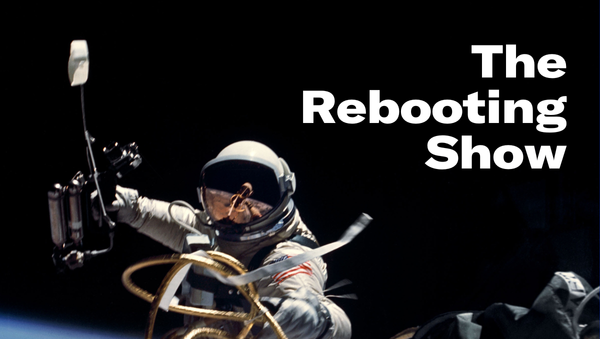Dignified decline
Old publishing brands never die

This week, I'm taking a look at how publishing brands don't die but live out their golden years as different businesses. And why AI is a good for podcasts/audio. First up, a message from Omeda

Discover what’s driving growth and engagement

Evaluate your email strategy and plan your new campaigns with confidence with our Email Engagement Report, which analyzes data from more than 1.7 billion emails sent by media brands through Omeda during Q1 2024, focusing specifically on clicks and click-throughs. Included in this report:
- Overall email engagement
- Performance by deployment type
- An interview with Dan Oshinsky of Inbox Collective
Forever brands
For all the talk of a media extinction event, it sure is hard to kill a media brand, not when there’s still money to be made.
Media brands don’t really die now; they live on as value-extraction exercises. Some live on as SEO farms, others as licensing factories, some as agencies and events companies, and many as some combination. This is an inevitability as the traffic to these publications is no longer considered an audience. The economics of the old businesses require rationalizing the business, even if the brands morph into a husk of what they once were.
Deadspin, which can legitimately be classified as a meaningful digital media brand, is off to do hard work as a front for a Maltese gambling operation. Vice’s publishing sites are now operated by a PE firm literally named Savage Ventures so safe bet their brands are in for ruthless monetization experience.
They will join an array of magazines who duke it out in the SEO fighting pits. This too will become a sector in structural decline. These brands live on in some different form that as time passes becomes more familiar or at least less jarring. It’s part of the capitalism life cycle. At some point Popular Mechanics writing affiliate content about pet hair makes sense. It’s a far cry from the circa 1950s Brazil-edition of the magazine I perused a few summers ago in Porto.
Of course, SEO is no safe haven. Gartner’s finger-to-the-wind prediction is a decline of 25% of search referrals in a mere two years. The imminent rollout of Google’s generative search, coming on top of its aggressive moves to police the perps of the SERP, will add to those pressures.
There’s a certain nobility in wringing new value out of assets in decline. Nobody said all parts of the PE phase of life were dignified. There is an argument, made by niche media proponent John Yedniak, that “it’s time to move on and build something new” because money directed in this part of the media ecosystem crowds out funding for new models. Maybe. This industry is still vast, and I see the most promising new models raising modest amounts or, even better, none at all.
There’s a romantic impulse I have to prefer publications to burn fast, burn bright and end. Think of what the fate of Spy would be today. It would probably escape the SEO fate and instead have a more dignified path as an events and activations brand.
Life still has life, despite its top two seeds suggestions being people wondering if it still exists, now owned by Josh Kushner and Karlie Kloss. The magazine will be revived, but this is a brand destined for parties and events and other marketing activations. These brands still have value, despite Life being cryogenically frozen for 15 years. That value is tied in their brands, whether they produce the same or even any of the journalism that built the brand.
That’s why SI was never going to die. The brand is too valuable, and that’s why Authentic Brands Group bought it, not for anything to do with the content. They don’t want to deal with the messiness of publishing. Who wants unions, getting kneecapped by platforms and AI, and competing for fickle as dollars without unique data? Better off licensing the brand to sportsbooks and Orlando resorts.
Many magazines will become brand annuities. Time, Forbes and Fortune are running a variation of the same playbook: use the strength of the brand in many ways while continuing to create flourishes of solid journalism, even as their central role as a news source inexorably fades. Sure, the coupons hustle is not the most becoming aspect of this new phase of life, but things change and nothing lasts forever. Better to live on than hand wring over squishy notions of “legacy.”
There’s an economic utility in managing decline. Let’s face it: we are entering in a time when we will have many legacy businesses, with their natural lifespan pulled forward by technological shifts.
These brands are not what they once were. That’s just the truth, but I would bet on them being around and culturally relevant in five years. New models are emerging that are smaller but hardier. But part of the future of the media business is wringing new value out of strong assets that found themselves in declining markets with little power.
People complain about Forbes a lot, but that’s a major success story of a magazine managing a transition. Took a lot of swings at a lot of things, and it has emerged with a brand that’s still relevant.
Audio in the AI age
The OpenAI demo videos of the GPT4o — the branding in this area is something else — make me believe that words are in secular decline. I would be long on audio.
The other week, I was at a fancy dinner and sat next to a big media CEO who told me text businesses are bad businesses. “Everything is video,” he said.
I don’t think so. My experience with podcasts tell me that audio is going to do well in an AI era. The demos show how voice will be the main way people interact with AI. Soon people will expect voice interactions that return audio.
And I believe AI will help audio be used people will increasingly seek out non-synthetic media. AI slop is already flooding feed media. Social media overall is increasingly seen as a public health issue. I believe that’s why for all the amazing potential of AI a majority of people aren’t very excited by it. A weird number of people saw the AI tutor demo and cheered the coming eradication of teachers. (Also: won’t happen.) This is the path to talking about Universal Basic Compute.
Podcasting, which is synonymous with digital audio, is cyclical. And this is a time of retrenchment at the top of the market. Spotify continues to rationalize its strategy. The podcast gold rush turned out another ZIRP phenomenon.
I would still bet on audio over the long run. The success of a podcast like Acquired shows how podcasts can incubate media businesses. Just like newsletters, podcasts aren’t great standalone businesses. They have limited “surface area” for ads and poor measurement, targeting and ability to interact with the ads.
But podcasts have depth vs breadth. They are a good starting place to build a durable, loyal audience. And most are niche. Voice can beat video for intimacy and depth. Most of the video consumption is ephemeral feed views. It’s the new traffic.
I go back and forth about video clips from our podcasts. They’re good for LinkedIn promotion bc people like watching video in feeds. But they change the conversation to a degree. Video pushes people to be performative, and if your goal is as close to a normal conversation as possible, audio is better.
More media businesses will rely on other business lines for revenue. Podcast businesses are growing their businesses across memberships and live events.
Scott Porch, founder of Big IP, which operates the business side of several popular lifestyle podcasts like The John Campea Show, Happy Sad Confused, Star Wars Explained, reinforced this during a recent conversation for The Rebooting Show. He acts as something of a talent manager in expanding these podcasts into more well rounded media companies, with revenue coming from memberships and events. The growth of these businesses will not be driven by ads necessarily.
"Podcasters are influencers in a lot of respects and they monetize like an influencer in a lot of respects,” Scott noted.
I’ll have the new episode of The Rebooting Show posted later today after navigating through the absolute mess Spotify made of Anchor, the formerly neutral podcasting platform Spotify bought during its free-spending days. As far as I can tell, Spotify did nothing to improve the product, and instead directed its energies to trying to advantage Spotify over Apple. Go figure.
That’s it for today. Send me your feedback by hitting reply or emailing me at bmorrissey@therebooting.com.




